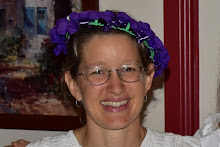We've arrived! We actually arrived a month ago, and moved into a 2-bedroom house in Port Jefferson, NY (thanks so much, Emily, for the encouragement - it's actually working for us, for now. We're using some of the boxes of books to divide the kids' bedroom into a half for the boys and a half for P). Ari is loving his job at Stony Brook University, and I'm trying to make up for November being a complete loss in terms of schooling. In addition to teaching the children, I'm working on navigating New York's home school reporting requirements (which are much more stringent than those in Texas... they exist, to begin with... more on that later). I'm enjoying having my own kitchen, and have been doing a lot of cooking and baking. We found a farmer's market where you can get local apples for around 40 cents a pound. Pie, anyone?
We returned to Texas for Christmas (a 2-day drive, but worth it to see family and friends again), and only just got back. It's nice not to be in the car any more, though all 3 kids did really well. Apart from the part where B found the box of his disposable diapers, and threw about 35 of them all over the car, and the older 2 then used the empty box as a projectile... aaaaah! And B developed a habit of yelling, over and over, "Please stop reading Hobbit, Mommy! Please stop reading Hobbit, Mommy!" But usually, he gave up after a few paragraphs to pages, and we successfully followed the adventurers all the way over the Misty Mountains, across Mirkwood, and to Smaug's demise. We have yet to see the results of the dwarves' gold lust, but we'll save that for after B's bedtime but before P and E's over the next few weeks.
I promised to blog about the Vibrant Dance conference Ari and I attended at the end of October (see my previous post). Being closely related to one of the organizers, we had the opportunity to attend the dinner for the speakers the night before the conference began. As the dinner was winding down, we joined a conversation with Bruce Waltke. I thought I'd start with something he said both at the dinner and in one of his talks, because it has important implications for Christian unity. He described his response to the question, "Who is my brother [or sister]?" To answer the question, he looked at how Abraham, Moses, or David might have seen it. God gave Abraham the covenant of circumcision - an external, physical sign of inclusion in the people of God. For Christians, that sign has been replaced by baptism. So if you have been baptized, you might be my brother or sister. The covenant God made with Moses involved the Law, of which the Ten Commandments are the most important part. So if you acknowledge your responsibility before God to follow the Ten Commandments, you might be my brother or sister. (Aside: no-one except Jesus has actually followed all ten commandments perfectly - I believe Bruce Waltke's point was simply that Christians acknowledge them as a standard to aim for; that we recognize the fact of God's righteousness as represented in the Ten Commandments). The covenant God made with David was that the kingdom would be his family's forever - a physical descendant of his would reign as king. So if you acknowledge Jesus, David's heir, as the king of your life, you might be my brother or sister. Finally, in the New Testament, we see Jesus' incarnation, death, and resurrection. So if you accept those historical realities, you might be my brother or sister.
To sum up, if I find myself asking whether someone is my brother or sister in Christ, I can ask: Are they willing to be publicly identified with him? Do they acknowledge God's perfect law and righteousness? Have they submitted to Jesus' kingship? Do they believe that Jesus was fully God as well as fully man, that he died, and that he returned to life?
Note, of course, that nowhere in this analysis does someone's position on the timespan of God's creation appear - we can be brothers and sisters in Christ no matter how we interpret those particular details. I think that having that perspective is an essential prerequisite for having a gracious dialogue: we start from the understanding that we are brothers and sisters in Christ, and dialogue on the details on which we differ knowing that we're all going to be around the same Thanksgiving table as part of God's family a million years from now.
I should say, I didn't take detailed notes of what Bruce Waltke had to say - the above summary is based on my memory, 2 months later, of what I heard him say. So I may have made some errors in representing him. If you're unhappy with any of the above, the fault is more likely to be mine than his.
Friday, December 30, 2011
Subscribe to:
Posts (Atom)

